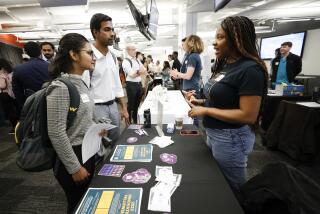In Sluggish Job Market, Some Fields Still Are Hot
- Share via
ATLANTA — Pete Nguyen has friends graduating with MBAs and PhDs, but they are struggling to find work in a sluggish job market. His own job search, though, was hardly a roll of the dice.
Armed with a degree in pharmacy, he had so many job offers that he and three friends from the University of Michigan pharmacy school focused mainly on where they wanted to live, settling on Las Vegas.
“When we were thinking about what city to go to and where to move to--New York, L.A., Miami, Vegas--basically, whichever city we decided to move to, we could pretty much be guaranteed a job as a pharmacist,” said Nguyen, a San Diego native who graduated last week.
Pharmacy is among a handful of industries--including nursing, accounting and education--that are starved for new college graduates even though most businesses aren’t hiring.
The National Assn. of Colleges and Employers reports that U.S. employers are expected to hire 36% fewer new college graduates this year. Manufacturers are hiring less than half as many grads as in 2000-01.
“Looking at a 36% drop in hiring, it’s quite an adjustment,” said Camille Luckenbaugh, employment information manager for NACE, a nonprofit consortium of colleges and employers.
“We’ve gone from people handing out their business cards at spring break to students beating down the doors and trying to find jobs that are available,” she said.
But graduates in high-demand fields are finding companies competing for fresh talent.
“Pretty much any time I put a resume in anywhere, they call me in like a day or day and a half at most,” said Traci Pelchat, who graduates next week from the University of Washington’s highly rated nursing program. “The shortage is so bad right now, pretty much any place that hires RNs is calling me.”
Pelchat said she’s considering a handful of positions each offering upward of $24 an hour--almost $50,000 a year for a 40-hour workweek--and signing bonuses of about $2,500.
Accountants are still in great demand as well, despite the turmoil that has plagued that industry over the last six months.
The nine or 10 accounting students at the University of Georgia who accepted positions with Arthur Andersen had their offers withdrawn when the firm was indicted on federal charges related to the Enron Corp. collapse. But most of them have been able to find work with other companies, university program coordinator Patti Hoyt said.
“I think probably by the end of the summer they’ll have something lined up pretty easily,” Hoyt said.
School officials have not surveyed all accounting graduates from this spring, but Hoyt said the placement rate should be close to last year’s, when only one graduate out of 60 didn’t have a job within a few months.
Average starting salaries are up slightly to $45,000 to $46,000 this year from $43,500 last year, Hoyt said.
A common explanation for the abundance of jobs in high-demand fields is the time required to earn a degree in one of them. Many undergraduate accounting students go on to earn master’s degrees, and pharmacy school often takes at least six years.
“One of the biggest deterrents why people don’t want to go into pharmacy is the B.S. is five years, while the PharMD is another year. And that other year makes a big difference,” said Jin Yun, from Saginaw, Mich., another of the Las Vegas-bound pharmacists.
But now, Yun said, with all that schooling behind him--nine years in his case--it’s time to face the problems and challenges of the real world.
“I just gotta control the gambling urge,” Yun said. “That’s probably going to be my biggest problem.”
More to Read
Inside the business of entertainment
The Wide Shot brings you news, analysis and insights on everything from streaming wars to production — and what it all means for the future.
You may occasionally receive promotional content from the Los Angeles Times.










